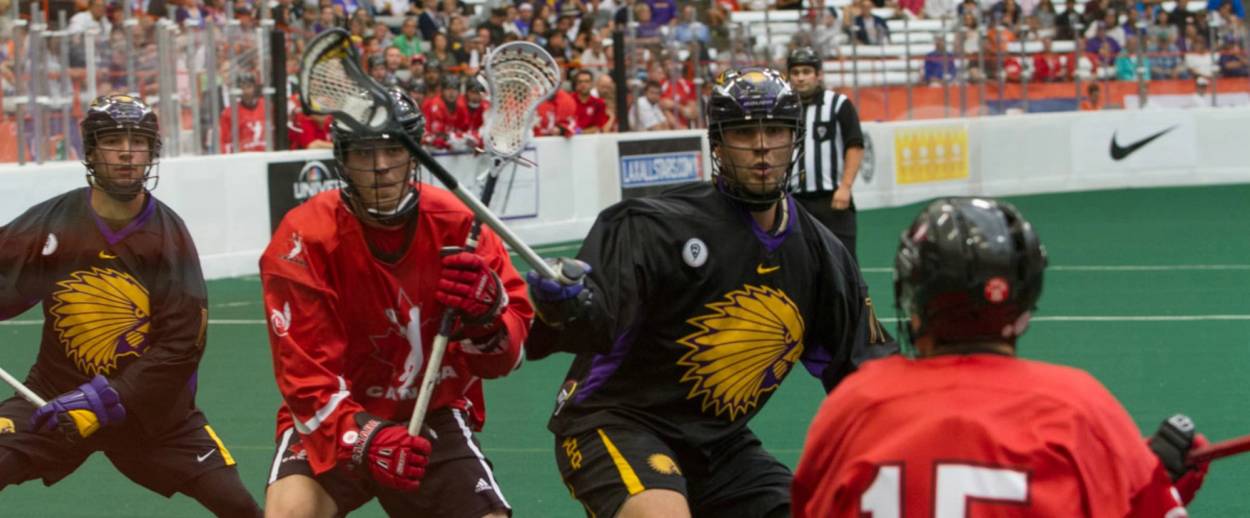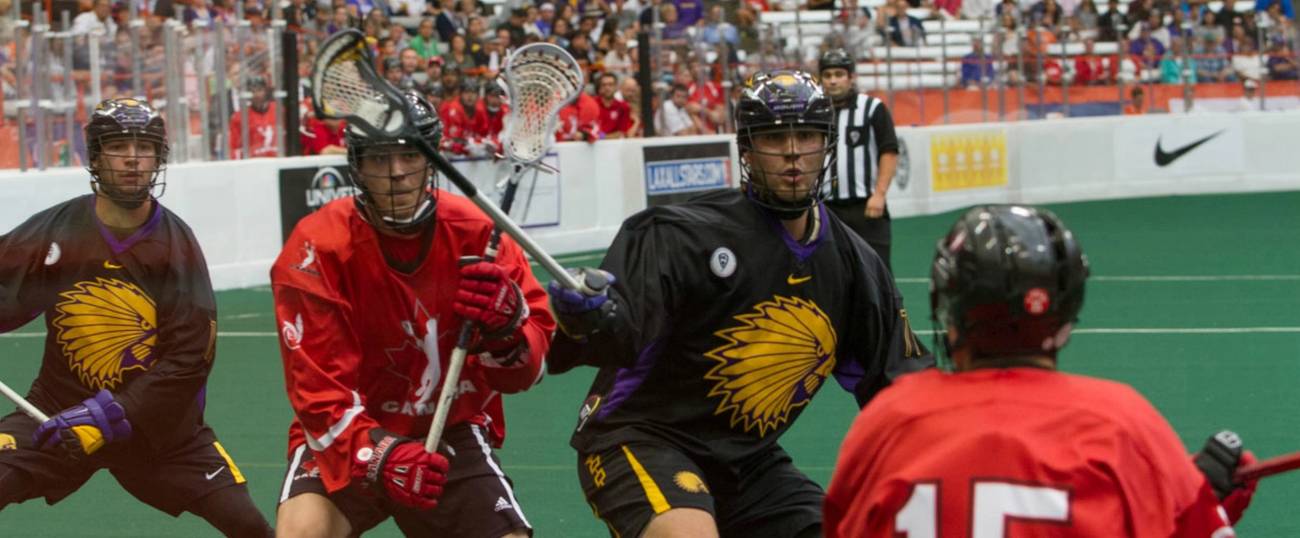When the Iroquois Nationals took the field against the United States at Netanya Stadium on Thursday night—decked out in purple helmets with golden eagles on either side—they had been in Israel for about six hours and had never practiced or played as a team together.
On Wednesday afternoon the Iroquois team spent six tense hours at Toronto’s Pearson airport, unsure of whether Canadian authorities would clear them to travel to Israel. At issue was the team’s Haudenosaunee Confederacy passports—Canada wasn’t convinced Israel would accept the documents, leading to a cascade of bureaucratic delays broken only through the intervention of people like Justin Trudeau and Robert Kraft. In 2010, the Iroquois team was prohibited from traveling to the world championships in England because of passport issues, and as coach Mark Burnam explained after the game, a repeat scenario might have doomed the program altogether. “If it happened again it might have ended the Iroquois national team,” said Burnam. “You just don’t know.”
Why not fudge the passport issue? one might reasonably wonder—after all, the players are all born in Canada or the United States and are eligible for American or Canadian travel documents. But the passports are the entire issue. “This logo right here means everything to my people and to me,” Tehoka Nanticoke, a University at Albany sophomore widely considered to be the top underclassman in NCAA lacrosse said in a post-game interview. “We could have sat in the airport for another day, and still. Traveling on our own passport and playing in front of the world means a lot to me.” The Iroquois could make it much easier on themselves if the team’s identification with their people were a pro forma or self-congratulatory sort of thing, which it most definitely is not. This is the team of the Iroquois nation—they want to compete as what they are, or not compete at all.
The final score on Thursday was 17-9 in favor of the United States, but the result wasn’t the night’s key takeaway. The first half of the game is already on its way to legend status in lacrosse circles: People will brag about having seen the Iroquois take a two-goal halftime lead against the Americans six hours after getting off a 10-hour flight across six time zones. “I got chills watching that first half,” someone on the press bus said after the game, a glint of wonder still lingering.
Early in the first, Lyle Thompson flung a rocket past U.S. goalie John Galloway, who was squared to his attacker the entire play. “Have we had the ‘who’s the greatest player in the world conversation yet?” one of my press-box mates asked lacrosse broadcaster and ILIndoor.com editor Stephen Stamp. “Yeah, it’s a short conversation,” Stamp said. “It’s Lyle Thompson.” Thompson has the spindly body of an undersized tight end and his hair trails into into an intricate three-foot braid that whips out of the back of his helmet whenever he zig zags around a defender. Thompson’s speed and reach subverts any size advantage of whomever’s guarding him—he has an uncanny sense of where the play is going regardless of what side of the field he’s on, and is fast enough to streak to the goal unharassed even if he’s taking the ball up from deep in his own zone. After the game, he walked me through how he positioned himself on his first goal, shifting to within 10 yards of the target before barreling into an open shooting lane: “All I needed was to have my hands free.” Later, he added: “Twenty-four hours ago I didn’t expect I’d be here.”
Soon after Thompson’s triumph, Nanticoke fried Galloway on a running shot from point blank. Not only did the Iroquois jump out to a 3-0 lead. They were, for about a quarter, overcoming supposed deficiencies on their own end, effectively neutralizing the Americans’ shooters by sliding defenders into the area between “X”—the menacingly named frontier behind the goal from which the offense is often orchestrated, something that makes lacrosse the odd sport where the attack frequently moves in the opposite direction of the objective itself—and the U.S.’s murderer’s row of scorers, which includes players like Thomas Schreiber, another entrant in the “who’s the best in the world?” discussion. The Iroquois were relentless in transition, and at halftime, they had a 7-5 lead. The hardships of the previous day had ceased to matter or even exist. They were beating the best team in the world on zero hours of sleep.
“The Iroquois are playing the game they’ve played their whole lives” explained Mark Donahue, an editor and writer at Lacrosse All-Stars. “The U.S. are trying to play the style Canada beat them with four years ago.” The Americans lost to Canada during the 2014 championship in Denver, a match in which the northerners played a flummoxingly slow and deliberate style that took brilliant advantage of some of the idiosyncrasies of international lacrosse rule. More recently, the U.S., which set its roster way back in January with an eye towards team cohesion, had fallen to the Major League Lacrosse all-stars in a prechampionship warm up. The lackluster first half against the Iroquois added to a sense that they might not be up to their seemingly inevitable rematch with the Canadians.
The Iroquois team faces their own big question over the course of this tournament: Can an up-tempo, attacking team keep its energy going through a gruelingly paced competition? The second half, in which the U.S. dominated possession, took advantage of a weakening Iroquois passing game, scooped up every loose ball and outscored the opposition 12-2, suggests that perhaps they can’t. The second half was reminiscent of Croatia’s win over England in the previous night’s World Cup semifinal, which was another example of how difficult it is for a team to bridge their obvious weaknesses over the course of a game so long and physical that it’s almost designed to expose them. But the Iroquois Nationals still proved that they could compete at a high level under extraordinary physical and psychological stress. And last night was only a group matchup: Unlike the World Cup, the Lacrosse Championship puts the world’s best teams in their own group, with the top two finishers automatically making the semifinals and the third and fourth place teams advancing to the quarters. “This was the first scrimmage we’ve had as a team,” Burnam stressed. “I’m telling you, we’ll just get better.”
The Israeli national team opened up their slate of games with a win over Jamaica on Thursday afternoon right before the opening ceremony at Netanya Stadium. Israel won handily, but Jamaica’s Hakeem Lecky, a former Syracuse standout, scored the first true golazo of the tournament in the first quarter, stutter-stepping into a spin move off an Israeli defender and then firing a side-armed laser at an impossibly low trajectory. Israel ended up winning the match handily, dominating on face-offs and grounders—crucial elements of a sport without a shot clock or a time limit on how long an individual player can hold the ball.
The Israelis, widely thought to be in contention for one of the tournament’s medal spots, are not a team of American ringers. Many of their players are Americans who are now Israeli citizens, and Netanya native Uri Bar David had a large cheering section. About 1,000 Israeli youth lacrosse players were in attendance, and they were a cross section of the country’s Jews, chattering to each other in Hebrew and wearing jerseys from their local lacrosse programs. As someone noted during the opening ceremony, Israel went from having almost no lacrosse players seven years ago to having several thousand now.
Israeli lacrosse largely sprang from Americans who brought the game east. It’s not just lacrosse players from the Northeast making aliyah, either—American players and coaches have run clinics in the country and helped to set up a self-sustaining infrastructure. “They’re really good about developing players here, and about getting players from the U.S. to come here,” Ryan Conwell, a Lacrosse All-Stars writer sporting a hat reading GROW THE GAME, explained.
From one perspective, Israeli lacrosse is part of a Jewish cultural exchange happening outside of the usual areas of concern for diaspora communities. The question of how and whether American Jews are drifting away from their Israeli cousins is such an obsession these days that it’s easy to miss how the countries’ communities impact one another in areas that have little or in fact nothing to do with politics or religion.
One point of curiosity: Is the international lacrosse establishment actually happy to be here? As best I can tell, the answer is yes. During the opening ceremony, Federation of International Lacrosse president Sue Redfern commended Israel for putting the tournament together with only a year of planning. The weather is a bit of an issue: The idea of a lacrosse tournament in Israel in July is mildly ludicrous, but the rules of this tournament mandate frequent stoppages in play for hydration. There are almost no actual lacrosse fans in Israel, and an entire grandstand at Netanya Stadium sat empty—an Iroquois-U.S. opening night match would have drawn a crowd three times larger than this one in Canada or the United States. But as a few people noted to me, this is the first lacrosse championship ever held in a non-English-speaking country. It also feels slightly indecent to complain about being in Netanya at any time of the year. As Donahue explained, when England pulled out of hosting the tournament in May of 2017 there was serious talk of having the event in Providence, Rhode Island. “If we were in Providence right now I’d be so pissed,” Donahue said. “I’d spend my four-year vacation in Providence? Pfft.”

